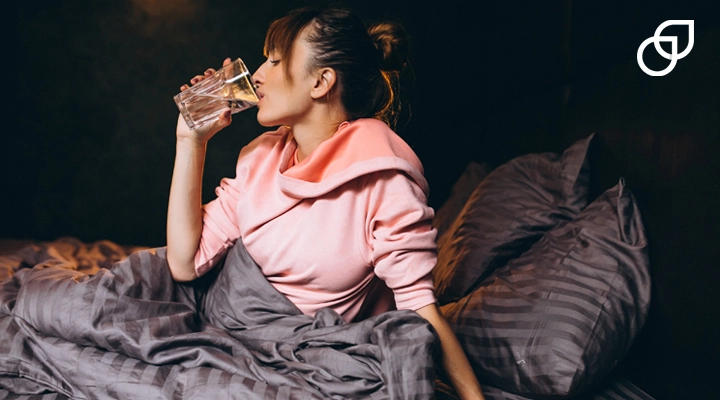Do you ever find yourself waking up dehydrated in the middle of the night, thirsty and reaching for a glass of water?
Ever wondered why your body experiences dehydration during sleep, craving water when the whole world is asleep?
Join us as we discover the complicated world of night thirst, exploring the reasons behind this nocturnal phenomenon.
Nighttime Thirst Causes
1) Dehydration
One of the primary reasons behind night thirst is dehydration. Throughout the day, our bodies lose water through various processes such as sweating and urination. However, during sleep, these losses continue, but without the replenishment of fluids. As a result, by the time midnight strikes, you might find yourself craving a drink.
2) Medication
Certain medications can have a diuretic effect, meaning they increase urination and contribute to dehydration. If you take medications before bedtime, they could be responsible for your excessive thirst at night.
3) Dry Air
Indoor heating and air conditioning can create a dry environment, leading to increased evaporation of moisture from your body. Breathing in this dry air throughout the night can leave you waking up dehydrated and thristy.
4) Medical Conditions
Underlying medical conditions such as diabetes or kidney disease can cause excessive thirst at night. These conditions may disrupt the body’s fluid balance, leading to increased water intake to compensate.
5) Sleep Disorders
Sleep disorders like sleep apnea can also trigger night thirst. Disrupted sleep patterns and irregular breathing can result in dehydration during sleep, prompting your body to signal for more fluids.
6) Hangover
After a night of drinking, your body may be severely dehydrated, leading to intense thirst the next morning or in the middle of the night.
How to Prevent Excessive Thirst at Night?
To prevent excessive thirst at night, consider these strategies:
- Stay hydrated throughout the day.
- Limit alcohol and caffeine intake, especially before bedtime.
- Use a humidifier to add moisture to the air in your bedroom.
- Discuss any medication-related concerns with your healthcare provider.
What Is Dry Mouth?
Dry mouth, also known as xerostomia, occurs when your mouth doesn’t produce enough saliva to keep it moist. This can lead to discomfort and difficulty in chewing, swallowing, and speaking.
Dry Mouth Symptoms
Symptoms of dry mouth may include:
- Persistent thirst
- Sticky or dry feeling in the mouth
- Sore throat
- Dry, cracked lips
- Bad breath
- Difficulty speaking or swallowing
Causes of Dry Mouth
There are various factors that can lead to dry mouth, including:
- Medications
- Dehydration
- Smoking or chewing tobacco
- Aging
- Nerve damage
- Certain medical conditions such as diabetes and Sjögren’s syndrome
When To See a Doctor?
If you constantly experience dry mouth or excessive thirst at night, it’s essential to consult a healthcare professional. Your physician will help identify the underlying causes and recommend appropriate treatment.
Frequently Asked Questions
Does being thirsty at night mean diabetes?
Not necessarily. While excessive thirst at night is a common symptom of diabetes, it can also be caused by several other factors like dehydration, medications, or dry air.
What deficiency causes excessive thirst at night?
Excessive thirst at night can be caused by dehydration, which occurs when the body lacks enough fluid intake to meet its needs.
Is it OK to sleep when dehydrated?
It’s generally not recommended to sleep when dehydrated, as dehydration can lead to discomfort and potentially worsen health issues. It’s important to address dehydration by drinking fluids before bedtime to ensure a comfortable and restful sleep.

